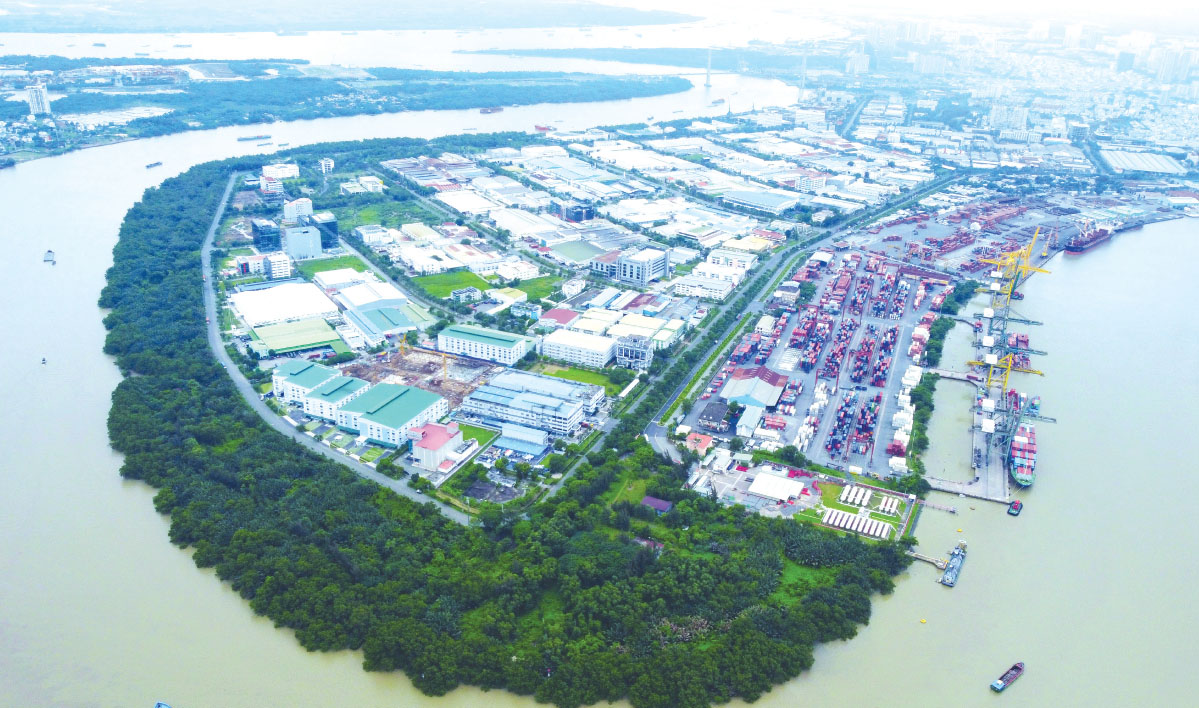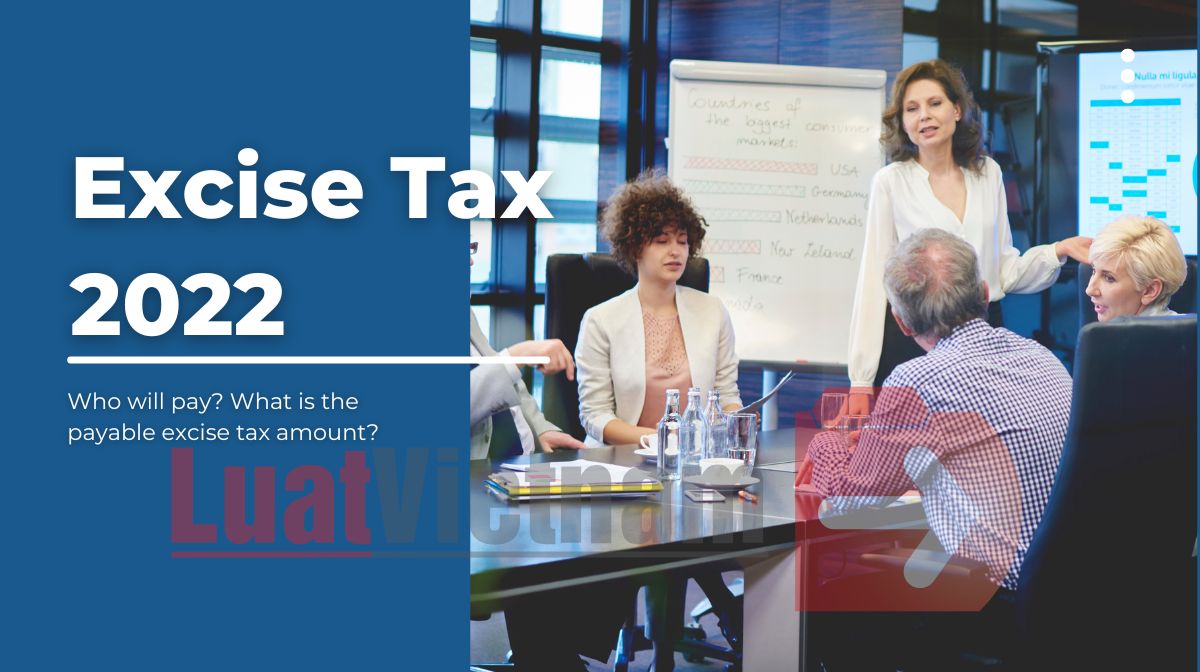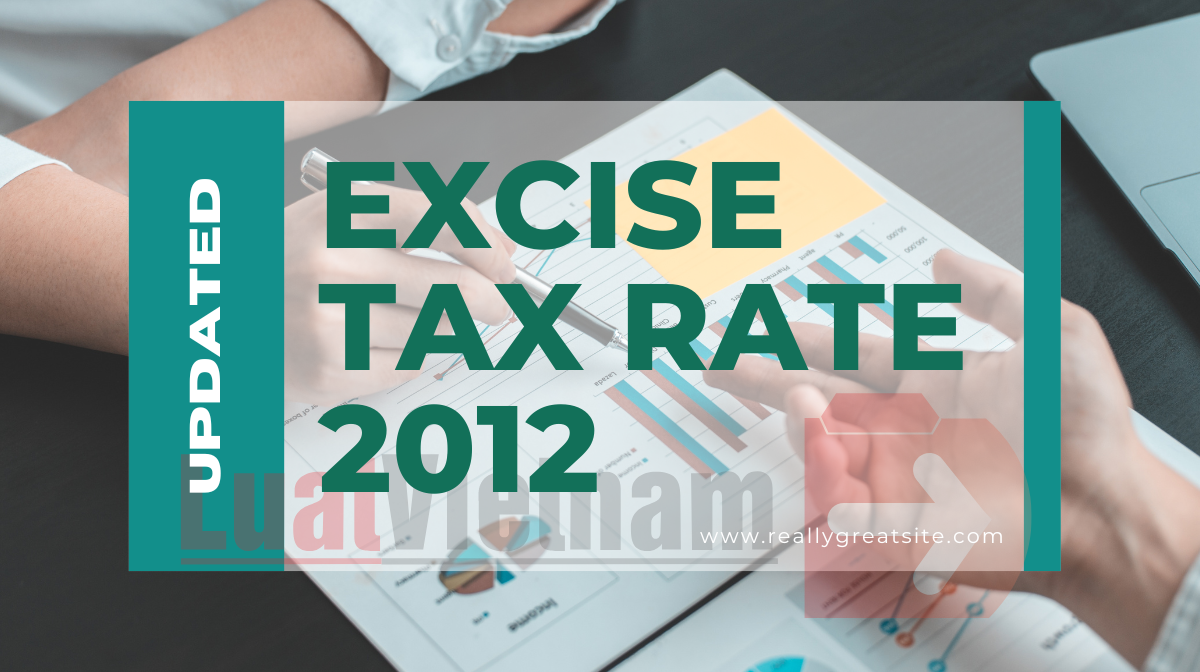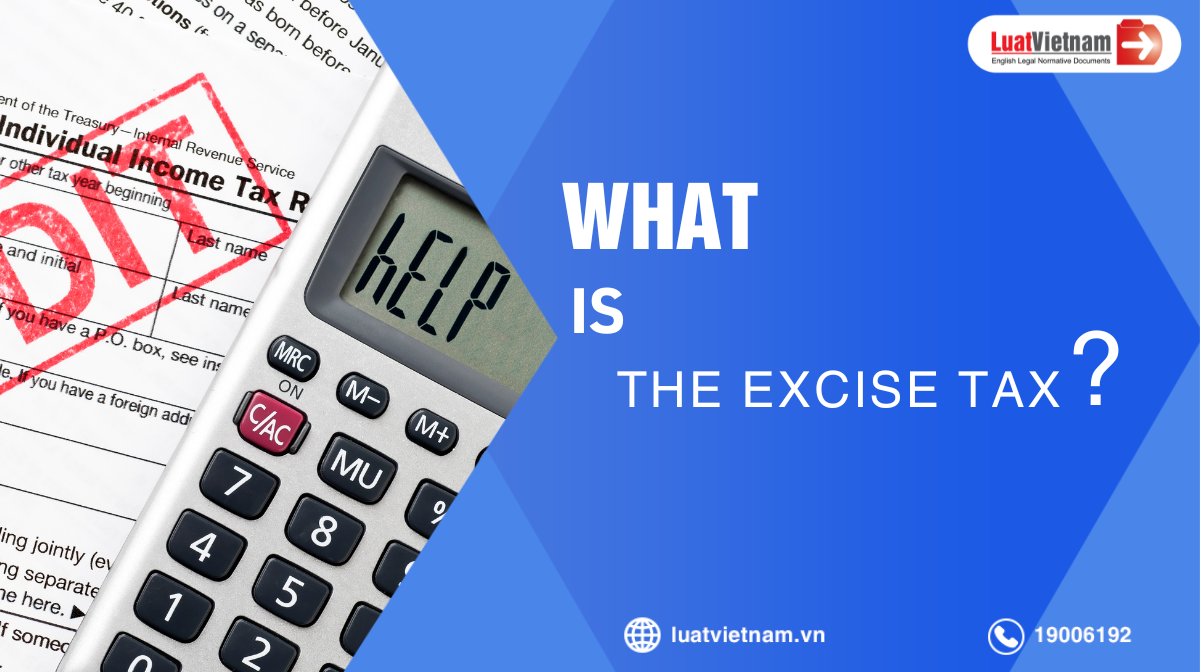THE GOVERNMENT
No. 108/2015/ND-CP | THE SOCIALIST REPUBLIC OF VIETNAM
Independence - Freedom - Happiness Hanoi, October 28, 2015 |
DECREE
Detailing and guiding a number of articles of the Law on Excise Tax and the Law Amending and Supplementing a Number of Articles of the Law on Excise Tax[1]
Pursuant to the December 25, 2001 Law on Organization of the Government;
Pursuant to the November 14, 2008 Law on Excise Tax and the November 26, 2014 Law Amending and Supplementing a Number of Articles of the Law on Excise Tax;
Pursuant to the November 29, 2006 Law on Tax Administration and the November 20, 2012 Law Amending and Supplementing a Number of Articles of the Law on Tax Administration;
At the proposal of the Minister of Finance,
The Government promulgates the Decree detailing and guiding a number of articles of the Law on Excise Tax and the Law Amending and Supplementing a Number of Articles of the Law on Excise Tax.
Chapter I
SCOPE AND OBJECTS OF APPLICATION
Article 1. Scope of regulation
This Decree details and guides a number of articles of the Law on Excise Tax and the Law Amending and Supplementing a Number of Articles of the Law on Excise Tax.
Article 2. Taxable objects
1. Excise tax-liable objects are specified in Article 2 of the Law on Excise Tax, and Clause 1, Article 1 of the Law Amending and Supplementing a Number of Articles of the Law on Excise Tax.
a/ Aircraft and yachts specified at Point e, Clause 1, Article 2 of the Law on Excise Tax are those for civil use.
b/ Votive gilt papers and votive objects specified at Point k, Clause 1, Article 2 of the Law on Excise Tax exclude those which are children’s toys and teaching aids.
c/ Betting business specified at Point d, Clause 2, Article 2 of the Law on Excise Tax covers betting for sports and entertainment activities and other forms of betting as prescribed by law.
2. Excise tax-liable goods specified in Clause 1, Article 2 of the Law on Excise Tax are complete commodities, excluding component sets used for assembling these commodities.
Article 3. Non-taxable objects
Objects not liable to excise tax are specified in Article 3 of the Law on Excise Tax, and Clause 2, Article 1 of the Law Amending and Supplementing a Number of Articles of the Law on Excise Tax.
1. Imported goods not liable to excise tax mentioned at Point a, Clause 2, Article 3 of the Law on Excise Tax include:
a/ Goods imported as humanitarian aid or non-refundable aid, including also goods imported with non-refundable aid as approved by competent agencies; goods provided as humanitarian assistance or emergency relief for overcoming consequences of wars, natural disasters or epidemics;
b/ Overseas organizations’ or individuals’ gifts for state agencies, political organizations, socio-political organizations, socio-political-professional organizations, social organizations, socio-professional organizations or people’s armed forces units;
c/ Donations or gifts for individuals in Vietnam within the law-prescribed quotas.
2. Goods transited or transported via Vietnamese border gates or borders and goods transported to/from border gate as specified at Point b, Clause 2, Article 3 of the Law on Excise Tax include:
a/ Goods transported from exporting countries to importing countries via Vietnamese border gates without going through procedures for their import into and export from Vietnam;
b/ Goods transported from exporting countries to importing countries via Vietnamese border gates and brought into bonded warehouses without going through procedures for their import into and export from Vietnam;
c/ Goods transited or transported via Vietnamese border gates or borders under agreements signed between the Vietnamese Government and foreign governments or between agencies or representatives authorized by the Vietnamese Government and foreign governments;
d/ Goods transported from exporting countries to importing countries not via Vietnamese border gates.
3. Aircraft and yachts used for commercial transportation of cargos, passengers and tourists and aircraft used for security and national defense purpose.
Aircraft and yachts not used for commercial transportation of cargos, passengers and tourists and for security and national defense purpose shall be liable to excise tax under the Law on Excise Tax and the Ministry of Finance’s guidance.
4. Cars specified in Clause 4, Article 3 of the Law on Excise Tax include cars which, according to manufacturer standards, are designed to be used as ambulances, prison vans or hearses; cars designed with both seats and standing places for transporting 24 persons or more; cars operating in recreation, entertainment and sports areas which neither are registered for circulation nor move on roads; and special-use cars and cars which neither are registered for circulation nor move on roads, as defined by the Ministry of Finance in coordination with related ministries and agencies.
5. Air-conditioners are those of a capacity of 90,000 BTU or less which, according to manufacturer standards, are designed only to be fitted aboard means of transport, such as cars, train carriages, ships, boats or aircraft.
6. Goods imported from foreign countries into non-tariff areas, goods sold from the inland into and used only in non-tariff areas, and goods purchased and sold between a non-tariff area and another, except goods brought into areas entitled to the application of regulations on residential non-tariff areas without solid fences, and under 24-seat passenger cars.
Chapter II
TAX BASES
Article 4. Taxed prices
1. For imported goods (except gasoline of all kinds) sold by goods importers and domestically produced goods, their excise tax calculation price shall be determined as follows:
Excise
tax calculation price | = | Selling price exclusive of value-added tax | - | Environmental protection tax (if any) |
1 + Excise tax rate |
Of which, the selling price exclusive of value-added tax shall be determined under the law on value-added tax.
a/ In case an importer of excise tax-liable goods (except gasoline of all kinds) or an excise tax-liable goods producer sells goods via its dependent cost-accounting establishments, the price serving as a basis for excise tax calculation is the selling price set by such establishment. In case an importer (except importers of gasoline of all kinds) or a producer sells goods via its agents that sell goods at prices set by the importer or producer for commissions only, the selling price serving as a basis for determining the excise tax calculation price is the commission-inclusive price set by that importer or producer;
b/ In case an importer of excise tax-liable goods (except under-24 seat cars and gasoline of all kinds) or a producer of excise tax-liable goods (except under-24 seat cars) sells goods to trading establishments, the price serving as a basis for excise tax calculation is the selling price set by that importer or producer, which must not be 7% lower than the average selling price set by such trading establishments.
If the selling price set by the importer of excise tax-liable goods (except under 24-seat cars and gasoline of all kinds) or by the producer of excise tax-liable goods (except under 24-seat cars) is 7% lower than the average selling price set by the trading establishments, the excise tax calculation price shall be assessed by the tax office under the law on tax administration.
Trading establishments provided at this Point are those not bearing the parent company-subsidiary relation, or not being subsidiaries in the same parent company, with the importer or producer, and are the primary establishments in the stage of commercial circulation. The parent company-subsidiary relation shall be determined under the Law on Enterprises.
c/ In case an importer or an establishment producing and assembling under 24-seat cars sells cars to trading establishments:
For an importer of under-24 seat cars, the price of an imported car serving as a basis for excise tax calculation is the selling price set by that importer, which must not be lower than 105% of its cost price. The cost price of an imported car consists of import-duty calculation price plus (+) import duty (if any) plus (+) excise tax at the stage of import. If the selling price of a car set by its importer is lower than 105% of its cost price, the excise tax calculation price shall be assessed by the tax office under the law on tax administration.
For an establishment producing and assembling under 24-seat cars, the price of a car serving as a basis for excise tax calculation is the selling price set by that producer, which must not be 7% lower than the average selling price set by the trading establishments. The average selling price set by the trading establishments which is used for comparison is the selling price exclusive of costs of equipment and spare parts additionally installed by the trading establishments at customers’ request. If the selling price set by the establishment producing and assembling under 24-seat cars is 7% lower than the average selling price set by the trading establishments, the excise tax calculation price shall be assessed by the tax office under the law on tax administration.
2. For imported goods, their excise tax calculation price at the stage of import shall be determined as follows:
Excise tax calculation price = Import-duty calculation price + Import duty.
The import-duty calculation price shall be determined under the law on import duty and export duty. For imported goods eligible for import duty exemption or reduction, their taxed price is exclusive of the exempted or reduced import duty amount.
3. For excise tax-liable goods, their taxed price is inclusive of the tare value.
For bottled beer, if a deposit is made for bottles, producers and customers shall make quarterly finalization of such deposit and include the deposit sum equivalent to the value of irrecoverable bottles in the excise tax calculation turnover.
4. For excise tax-liable processed goods, their taxed price is the selling price set by the processing-ordering establishment or the selling price of products of the same or similar kind at the time of goods sale.
In case the processing-ordering establishment sells goods to trading establishments, the goods’ taxed price shall be determined under Point b or c, Clause 1 of this Article.
5. For goods produced in the form of business cooperation between a producer and an user or owner of goods trademarks (brands) or production technologies, their excise tax calculation price is the selling price set by that user or owner. In case an establishment produces goods under a franchise license and transfers goods to Vietnam-based branches or representatives of foreign companies for sale, the goods’ excise tax calculation price is the selling price set by those branches or representatives.
In case such establishments sell goods to trading establishments, the goods’ taxed price shall be determined under Point b or c, Clause 1 of this Article.
6. For goods sold on installment or deferred payment, their excise taxed price is the one-off selling price of such goods, exclusive of the installment or deferred payment interest.
7. For services, their excise tax calculation price is the service charge set by the service provider.
a/ For golf business, the taxed price is the value-added tax-exclusive sales of membership cards or golf-playing tickets, including golf playing charges, ground maintenance, buggy and caddy hire, deposit (if any) and other charges paid by golf players or members to golf businesses. In case golf businesses trade in other goods or services not liable to excise tax, such as hotel, catering, goods sale or game services, such goods or services are not liable to excise tax.
b/ For casino or prized video game business, the taxed price is the turnover from such business minus (-) the prizes paid to customers;
c/ For betting business, the taxed price is the turnover from the sale of betting tickets minus the paid prizes;
d/ For dance hall, massage parlor and karaoke bar business, the taxed price is the turnover from such business, inclusive of turnover from catering and other associated services;
dd/ For lottery business, the taxed price is the turnover from the sale of tickets of licensed lotteries in accordance with law.
8. For goods and services used for barter, internal consumption, donation or sales promotion, their excise tax calculation price is the taxed price of goods or services of the same or similar kind at the time of barter, internal consumption, donation or sales promotion.
9. Excise tax calculation prices of goods and services specified in this Article are inclusive of revenues in addition to goods selling prices or service charges (if any) enjoyed by production and business establishments. Particularly for tobacco commodities, their excise tax calculation prices are inclusive of compulsory contributions and support amounts specified in the Law on Prevention and Control of Tobacco Harms.
For goods, the time of turnover generation is the time of transfer of the right to own or use the goods to the purchaser, regardless of whether or not money has been collected; for services, the time of turnover generation is the time of completing service provision or the time of making a service provision invoice, regardless of whether or not money has been collected.
Article 5. Tax rates
Excise tax rates must comply with the Excise Tariff specified in Clause 4, Article 1 of the Law Amending and Supplementing a Number of Articles of the Law on Excise Tax.
1. Cars designed for both passenger and cargo transportation as specified at Points 4d and 4g of the Excise Tariff are those designed with 2 or more rows of seats and fixed partitions between passenger compartments and cargo holds under the national standards prescribed by the Ministry of Science and Technology.
2. Cars running on gasoline in combination with bio-fuel or electricity as specified at Point 4dd of the Excise Tariff are those which, according to manufacturer standards, are designed to have a mixed gasoline ratio not exceeding 70% of the total fuel used, and hybrid cars which, according to manufacturer standards, are designed to have a consumed gasoline ratio not exceeding 70% of the consumed fuel against the most gasoline-efficient cars of the same seats and cylinder capacity on the Vietnamese market.
3. Cars running on bio-fuel or electricity as specified at Points 4e and 4g of the Excise Tariff are those which, according to manufacturer standards, are designed to run entirely on bio-fuel or electricity.
Chapter III
EXCISE TAX REFUND AND DEDUCTION
Article 6. Tax refund
Excise tax refund must comply with Article 8 of the Law on Excise Tax.
1. Goods temporarily imported for re-export as specified at Point a, Clause 1, Article 8 of the Law on Excise Tax include:
a/ Imported goods for which excise tax has been paid but which are still kept under customs supervision in warehouses or yards at border gates and will be re-exported abroad;
b/ Imported goods for which excise tax has been paid for transfer or sale abroad through Vietnam-based agents; and goods imported for sale to foreign firms’ vehicles on routes via Vietnamese ports or to Vietnamese vehicles operating on international routes as prescribed by law;
c/ Goods temporarily imported for re-export by the method of temporary import for re-export, for which the excise tax amounts already paid on the volumes of actually exported goods will be refunded upon re-export;
d/ Imported goods for which excise tax has been paid but which are re-exported abroad, and for which the excise tax amounts already paid on the volumes of re-exported goods will be refunded;
dd/ Goods temporarily imported for display at fairs, exhibitions or showrooms or for other purposes in a certain period under law for which excise tax has been paid and the paid excise tax amounts will be refunded upon re-export.
In case goods temporarily imported for re-export are actually re-exported within the tax payment time limit specified by the law on import duty and export duty, excise tax needs not to be paid on the volumes of actually re-exported goods.
2. For goods which are raw materials imported for export production and processing, the excise tax amounts already paid on the volumes of raw materials used for the production of actually exported goods will be refunded.
3. Procedures, dossiers, order and competence for excise tax refund for imported goods in the cases specified in Clauses 1 and 2 of this Article are similar to those for import duty refund prescribed in the law on import duty and export duty.
4. Production and business establishments shall make tax finalization of overpaid excise tax amounts upon merger, separation, split-up, dissolution, bankruptcy, ownership transformation, assignment, sale, contracting or lease of state enterprises.
5. Tax refund specified at Point d, Clause 1, Article 8 of the Law on Excise Tax covers:
a/ Tax refund under competent agencies’ decisions according to law;
b/ Tax refund under treaties to which the Socialist Republic of Vietnam is a contracting party;
c/ Tax refund in case paid excise tax amounts are larger than payable excise tax amounts as prescribed by law.
Article 7. Tax deduction
1. Taxpayers that produce excise tax-liable goods from excise tax-liable raw materials are entitled to deduction of the excise tax amounts paid for imported raw materials or raw materials purchased directly from domestic producers upon the determination of payable excise tax amounts. The deductible excise tax amounts are equivalent to the amounts of excise tax on raw materials used for the production of goods sold.
2. Payers of excise tax on excise tax-liable imported goods (except gasoline of all kinds) are entitled to deduction of excise tax amounts already paid at the stage of import upon determination of payable excise tax amounts for domestically sold goods. The deductible excise tax amounts are equivalent to the amounts of excise tax on excise tax-liable imported goods sold. For the excise tax amount not eligible for deduction, taxpayers may account it as an expense for calculation of enterprise income tax.
3. Excise tax amounts shall be deducted upon excise tax payment declaration.
4. The Ministry of Finance shall guide in detail the deduction of excise tax specified in Clauses 1 and 2 of this Article.
Chapter IV
IMPLEMENTATION PROVISIONS
Article 8. Effect and implementation guidance
1. This Decree takes effect on January 1, 2016, and replaces the Government’s Decrees No. 26/2009/ND-CP of March 16, 2009, and No. 113/2011/ND-CP of December 8, 2011, detailing a number of articles of the Law on Excise Tax.
2. The Ministry of Finance shall guide the implementation of this Decree.
Ministers, heads of ministerial-level agencies, heads of government-attached agencies and chairpersons of provincial-level People’s Committees shall implement this Decree.-
On behalf of the Government
Prime Minister
NGUYEN TAN DUNG

 Decree 108/2015/NĐ-CP ZIP (Word)
Decree 108/2015/NĐ-CP ZIP (Word) Decree 108/2015/NĐ-CP PDF (Original)
Decree 108/2015/NĐ-CP PDF (Original) Decree 108/2015/NĐ-CP DOC (Word)
Decree 108/2015/NĐ-CP DOC (Word)





